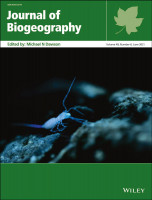Aim: Environmental niche tracking is linked to the species ability to disperse. While well investigated on large spatial scales, dispersal constraints also influence small-scale processes and may explain the difference between the potential and the realized niche of species at small scales. Here we test whether niche size and niche fill differ systematically according to dispersal syndrome within isolated oceanic islands. We expect that species with higher dispersal abilities (anemochorous or endozoochorous) will have a higher niche fill, despite their environmental niche size.
Location: Azores archipelago.
Taxon: Native seed plants.
Methods: We combined a georeferenced database of the species distribution within the archipelago (Azorean Biodiversity Portal/GBIF) with an expert-based dispersal syndrome categorization and a high-resolution climatic grid (CIELO model). Using four climatic variables (Annual Mean Temperature, Mean Diurnal Range, Annual Precipitation, Precipitation Seasonality), we calculated a four-dimensional hypervolume to estimate the niche size of each species. Niche fill was quantified as the suitable climatic space of the island that was occupied by the focal species.
Results: We found a significant relationship between dispersal syndromes and niche size, and also between dispersal syndromes and niche fill. Such relationships presented no phylogenetic signal. Endozoochorous species display higher niche fill compared to epizoochorous and hydrochorous species, and larger niches than anemochorous and epizoochorous. Differences among the remaining groups are not significant for either niche size or for niche fill.
Main conclusions: The ability of a species to track its niche at small scales is not tightly related to its dispersal syndrome, although endozoochorous species track their niche more efficiently than the rest of groups. Despite being intuitively appealing, dispersal syndrome classifications might not be the most appropriate tools for understanding dispersal processes at small scales.
Interested? Read more open access.

